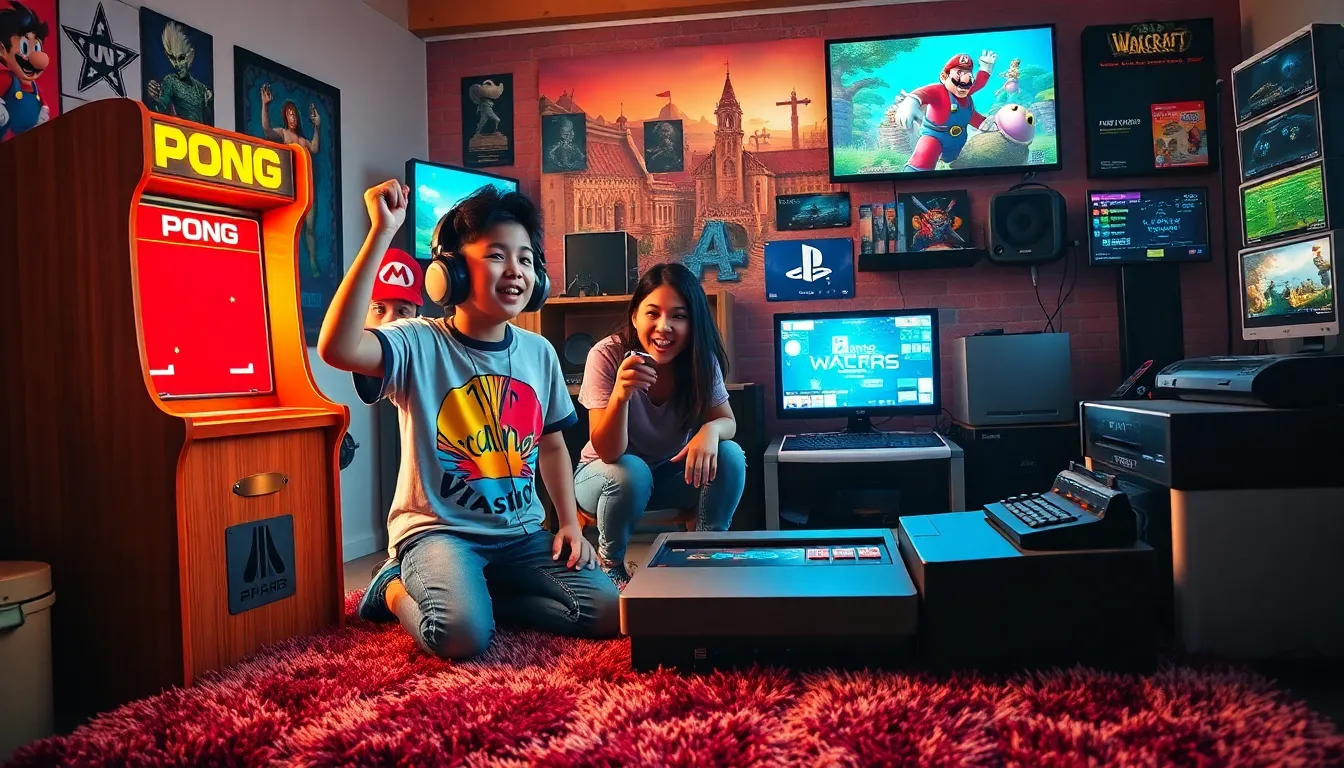In today’s digital landscape, gaming has transcended mere entertainment to become a pivotal part of global culture. From pixelated beginnings in the arcades of the 1970s to the immersive virtual worlds of modern consoles, the evolution of gaming reflects advancements in technology and societal changes. This article delves into the rich tapestry of gaming culture, exploring its history, community dynamics, technological innovations, and future directions, all while sharing personal reflections on what gaming truly means to those who are passionate about it.
Table of Contents
ToggleThe Evolution of Gaming: A Journey Through Time

The history of gaming is not just about the development of games: it’s a narrative of social connection, technological progress, and creative expression. Beginning in the early 1970s with simple arcade games like “Pong” and “Space Invaders,” gaming laid the groundwork for an expansive industry.
As the ’80s rolled in, home consoles brought gaming to living rooms. The Atari 2600 ignited the spark of gaming culture, allowing families to experience games together. Perhaps one of the most significant milestones was the release of the Nintendo Entertainment System (NES) in the late ’80s, which revitalized a struggling industry and introduced iconic franchises such as “Super Mario” and “The Legend of Zelda.”
The shift into 3D graphics in the mid-’90s revolutionized gameplay, with the emergence of the Sony PlayStation and Sega Saturn, which offered more immersive experiences. Online gaming began to flourish in the early 2000s, with games like “World of Warcraft” and platforms like Xbox Live ushering in a new era of connectivity.
Today, gaming is more diverse and accessible than ever. Mobile game downloads soar, and indie games continue to push creative boundaries, proving that gaming is a constantly evolving medium that reflects the times.
Understanding Gaming Communities and Their Impact
At the heart of gaming lies a vibrant collection of communities that foster passion and camaraderie among players. Online forums, social media groups, and platforms like Twitch have transformed how gamers communicate, share experiences, and establish friendships.
These communities are not just about playing games: they often serve as support networks, helping players navigate challenges in their lives. For instance, someone may find solace in a game or a community where they feel understood and accepted. This industry of shared experiences has given rise to movements like #GamerGate, which, even though its controversial nature, highlighted the complex relationship between gaming culture and societal issues.
Also, gaming communities drive the success of many titles through grassroots marketing and word-of-mouth. Popular streamers become brands themselves, influencing the gaming landscape by sharing gameplay, reviews, and experiences with millions. These interactions not only shape consumer behavior but also impact the development of future games based on community feedback.
The Role of Technology in Modern Gaming
Advanced technology continuously shapes the gaming landscape, pushing creative limits and enhancing player experiences. From graphics to gameplay mechanics, technology is ingrained in every aspect of gaming.
Virtual Reality (VR) and Augmented Reality (AR) are at the forefront of this leap. With devices like the Oculus Rift and Pokémon GO, players are treated to experiences that blur the lines between the real and virtual worlds. Such innovations not only demand advanced hardware but also challenge game designers to think outside traditional parameters.
Also, cloud gaming is on the rise, with services like Google Stadia and GeForce NOW allowing gamers to play anywhere, anytime, and on multiple devices without requiring high-end consoles. This technology democratizes access to gaming, reaching those who might have been excluded due to financial constraints or hardware limitations.
Finally, artificial intelligence (AI) is revolutionizing game development. More adaptive NPCs (non-player characters) and intricate storytelling driven by AI algorithms lead to more engaging, customized gameplay experiences. As these technologies advance, they will shape how games are designed and interacted with in the future.
The Future of Gaming: Trends to Watch
Looking ahead, the future of gaming is brimming with exciting possibilities and trends that promise to redefine player experiences. One significant trend is the continued rise of eSports, which has evolved from casual competition among friends to a billion-dollar industry. Events like The International for “Dota 2” and the League of Legends World Championship now attract millions of viewers, solidifying gaming’s status as a major spectator sport.
Cross-platform gaming is also becoming more prevalent, allowing players on different systems to join in on the same games. This trend fosters inclusivity and expands the gaming community, bringing together players who may otherwise never connect.
Besides, the emphasis on inclusivity within gaming narratives and character representation is set to grow. As players demand diverse characters and storytelling, developers are focusing on creating environments that reflect a broader spectrum of identities and experiences, acknowledging that gaming culture is enriched by its diversity.
Finally, as technology continues to advance, the convergence of gaming with other industries, such as film and music, will likely lead to innovative storytelling experiences, augmented by interactive elements that keep players engaged in new and creative ways.
Personal Reflections: What Gaming Means to Me
For many, gaming is devoid of mere entertainment: it’s a journey of self-discovery and expression. It has the power to connect individuals across borders and cultures, creating shared experiences in virtual worlds. The sense of achievement that comes from overcoming challenges, whether in an epic raid or a tricky puzzle, can build resilience and confidence in everyday life.
Also, gaming has always served as a stress reliever, a way to escape from the rigors of daily responsibilities. Engaging in a favorite game can transport players to fantastical realms, allowing them to unwind and rejuvenate.
Throughout the years, personal experiences with gaming have shaped perspectives and fostered friendships. Joining local gaming tournaments and online communities has led to meaningful interactions, where shared passions transcend geographical constraints and social barriers. Eventually, gaming isn’t just about pixels and codes: it’s a gateway to deep connections, personal growth, and collective joy.
Conclusion
The journey through gaming culture reveals a rich tapestry woven from history, community, technology, and personal experiences. As it continues to evolve, gaming remains an integral part of modern life, transcending entertainment to become a platform for connection, creativity, and innovation. Understanding the evolution, the role of technology, and the impact of communities enhances appreciation for this dynamic medium. For gamers old and new, the future is filled with endless possibilities, inviting all to participate in this exciting cultural phenomenon.




